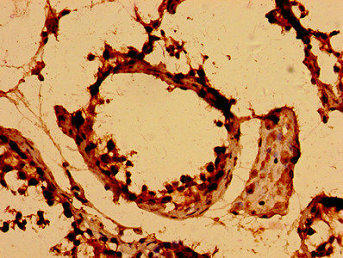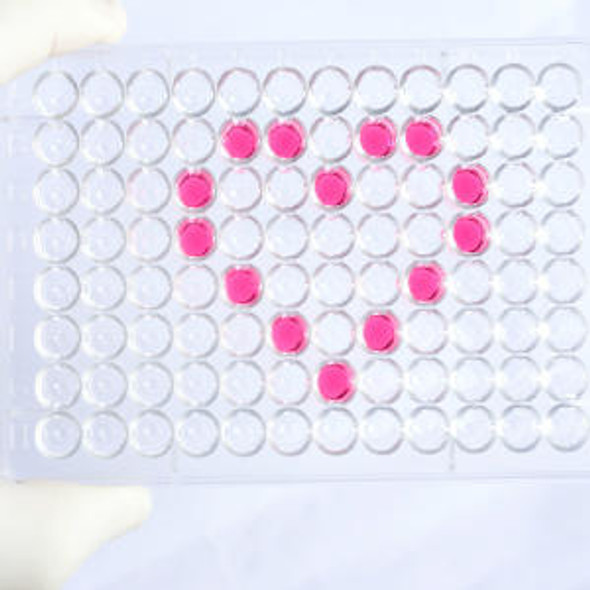Description
| Antibody Name: | DEFB126 Antibody (PACO54186) |
| Antibody SKU: | PACO54186 |
| Size: | 50ug |
| Host Species: | Rabbit |
| Tested Applications: | ELISA, IHC |
| Recommended Dilutions: | ELISA:1:2000-1:10000, IHC:1:20-1:200 |
| Species Reactivity: | Human |
| Immunogen: | Recombinant Human Beta-defensin 126 protein (36-111AA) |
| Form: | Liquid |
| Storage Buffer: | Preservative: 0.03% Proclin 300 Constituents: 50% Glycerol, 0.01M PBS, pH 7.4 |
| Purification Method: | >95%, Protein G purified |
| Clonality: | Polyclonal |
| Isotype: | IgG |
| Conjugate: | Non-conjugated |
 | Immunohistochemistry of paraffin-embedded human testis tissue using PACO54186 at dilution of 1:100. |
| Background: | Highly glycosylated atypical beta-defensin involved in several aspects of sperm function. Facilitates sperm transport in the female reproductive tract and contributes to sperm protection against immunodetection; both functions are probably implicating the negative surface charge provided by its O-linked oligosaccharides in the sperm glycocalyx. Involved in binding of sperm to oviductal epithelial cells to form a sperm reservoir until ovulation. Release from the sperm surface during capacitation and ovaluation by an elevation of oviductal fluid pH is unmasking other surface components and allows sperm to penetrate the cumulus matrix and bind to the zona pellucida of the oocyte (By similarity). In vitro has antimicrobial activity and may inhibit LPS-mediated inflammation. |
| Synonyms: | Beta-defensin 126 (Beta-defensin 26) (DEFB-26) (Defensin, β 126) (Epididymal secretory protein 13.2) (ESP13.2) (HBD26), DEFB126, C20orf8 DEFB26 |
| UniProt Protein Function: | defensin, beta 26: Has antibacterial activity (Potential). Belongs to the beta-defensin family. |
| UniProt Protein Details: | Protein type:Secreted; Secreted, signal peptide Chromosomal Location of Human Ortholog: 20p13 Cellular Component: glycocalyx; cell surface; extracellular region Biological Process: defense response to bacterium; innate immune response |
| NCBI Summary: | Defensins are cysteine-rich cationic polypeptides that are important in the immunologic response to invading microorganisms. The protein encoded by this gene is secreted and is a member of the beta defensin protein family. Beta defensin genes are found in several clusters throughout the genome, with this gene mapping to a cluster at 20p13. The encoded protein is highly similar to an epididymal-specific secretory protein (ESP13.2) from cynomolgus monkey. [provided by RefSeq, Jul 2008] |
| UniProt Code: | Q9BYW3 |
| NCBI GenInfo Identifier: | 119631093 |
| NCBI Gene ID: | 81623 |
| NCBI Accession: | EAX10688.1 |
| UniProt Secondary Accession: | Q9BYW3,Q562G3, Q9H1M5, |
| UniProt Related Accession: | Q9BYW3 |
| Molecular Weight: | 12,174 Da |
| NCBI Full Name: | defensin, beta 126 |
| NCBI Synonym Full Names: | defensin, beta 126 |
| NCBI Official Symbol: | DEFB126 |
| NCBI Official Synonym Symbols: | DEFB26; hBD-26; C20orf8; DEFB-26; ESP13.2; bA530N10.1 |
| NCBI Protein Information: | beta-defensin 126; beta defensin 26; beta-defensin 26; epididymal secretory protein 13.2; epididymal secretory protein ESP13.2 |
| UniProt Protein Name: | Beta-defensin 126 |
| UniProt Synonym Protein Names: | Beta-defensin 26; DEFB-26; Defensin, beta 126; Epididymal secretory protein 13.2 |
| Protein Family: | Beta-defensin |
| UniProt Gene Name: | DEFB126 |
| UniProt Entry Name: | DB126_HUMAN |






